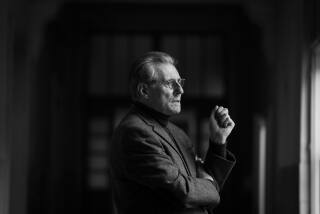Max Wall; British Dancer-Comedian Gained Fame in Beckett Plays
- Share via
LONDON — Max Wall, the music hall dancer and comedian who blossomed into an acclaimed stage actor in the plays of Samuel Beckett, died Tuesday after a fall. He was 82.
Wall--whose straggly wig, outsized boots and black tights made him look like an abrasive gremlin--fell at Simpson’s Restaurant in central London on Monday afternoon, said his agent, Joan Prichard. He never regained consciousness and died early Tuesday morning at Westminster Hospital of a fractured skull.
He became famous for his “Professor Wallofsky” character, a double-jointed eccentric whose bizarre walk was said to have inspired John Cleese of “Monty Python’s Flying Circus.”
Wall was born Maxwell George Lorimer in south London into a family of entertainers, and made his first stage appearance as a baby in a kilt. At 14 he played Jack in Mother Goose, with a traveling pantomime troupe, and in 1925 he landed his first London stage role, as a dancer.
After appearing on Broadway in Earl Carroll’s “Vanities” of 1932, he brought his madcap humor and dancing skills to many musicals and stage comedies in Britain. He made his radio debut in 1940.
Wall’s career went into decline after the much-publicized breakup of his first marriage, in which the father of five was linked to a young beauty queen, and he was reduced to working obscure north England nightclubs. He married and divorced twice more. His fortune dwindled to bankruptcy.
But his career was resurrected when his comic talents and clown face, having reputedly attracted the attention of Beckett, landed him parts in the Irish playwright’s “Waiting for Godot,” and “Krapp’s Last Tape.”
Wall played an unforgettable Archie Rice in a 1974 revival of John Osborne’s “The Entertainer,” a role already immortalized by Laurence Olivier.
Despite bouts of sciatica, Wall continued acting into his late 70s, including a role in John Arden’s “Sergeant Musgrave’s Dance.”
He took occasional film parts, including the sinister Jeremiah Flintwich in the 1987 version of “Little Dorrit,” Charles Dickens’ look at the socially pretentious London of the early 1800s.
More to Read
The biggest entertainment stories
Get our big stories about Hollywood, film, television, music, arts, culture and more right in your inbox as soon as they publish.
You may occasionally receive promotional content from the Los Angeles Times.










